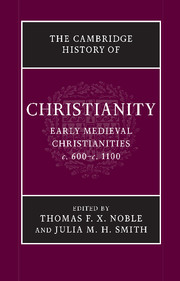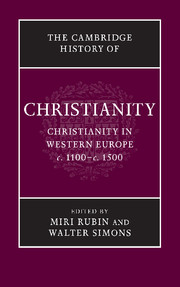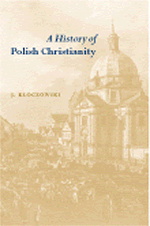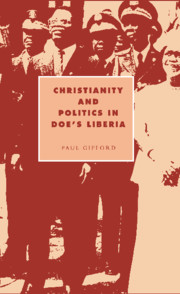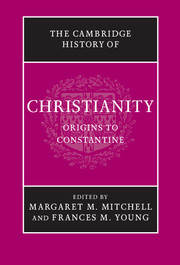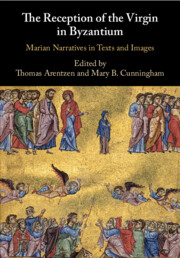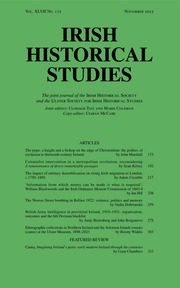The Cambridge History of Christianity
Volume 3. Early Medieval Christianities, c.600–c.1100
Part of Cambridge History of Christianity
- Editors:
- Thomas F. X. Noble, University of Notre Dame, Indiana
- Julia M. H. Smith, University of Glasgow
- Date Published: July 2014
- availability: Available
- format: Paperback
- isbn: 9781107423640
Paperback
Other available formats:
Hardback
Looking for an examination copy?
This title is not currently available for examination. However, if you are interested in the title for your course we can consider offering an examination copy. To register your interest please contact [email protected] providing details of the course you are teaching.
-
The key focus of this book is the vitality and dynamism of all aspects of Christian experience from late antiquity to the First Crusade. By putting the institutional and doctrinal history firmly in the context of Christianity’s many cultural manifestations and lived formations everywhere from Afghanistan to Iceland, this volume of The Cambridge History of Christianity emphasizes the ever-changing, varied expressions of Christianity at both local and world level. The insights of many disciplines, including gender studies, codicology, archaeology and anthropology, are deployed to offer fresh interpretations which challenge the conventional truths concerning this formative period. Addressing eastern, Byzantine and western Christianity, it explores encounters between Christians and others, notably Jews, Muslims, and pagans; the institutional life of the church including law, reform and monasticism; the pastoral and sacramental contexts of worship, belief and morality; and finally its cultural and theological meanings, including heresy, saints’ cults and the afterlife.
Read more- Emphasises dynamic transformations and cultural diversity of early medieval Christian experience, moving away from established 'monolithic' views
- Integrated approach to western, orthodox and eastern Christianities
- Fresh interpretations backed by recent scholarship in related disciplines including gender studies, archaeology, and anthropology
Reviews & endorsements
"...inspires awe....enormous diversity of of excellent scholars....stands out from rivals by its sheer scale....provide an effective structure....identification and development of themes is thoroughly successful....deeply impressive..." --Philip Jenkins
Customer reviews
Not yet reviewed
Be the first to review
Review was not posted due to profanity
×Product details
- Date Published: July 2014
- format: Paperback
- isbn: 9781107423640
- length: 878 pages
- dimensions: 229 x 152 x 50 mm
- weight: 1.26kg
- availability: Available
Table of Contents
Introduction: Christendom, c.600 Peter Brown
Part I. Foundations: Peoples, Places, and Traditions:
1. Late Roman Christianities Philip Rousseau
2. The emergence of Byzantine orthodoxy, 600–1095 Andrew Louth
3. Beyond empire I: Eastern Christianities from the Persian to the Turkish conquest, 604–1071 Igor Dorfmann-Lazarev
4. Beyond empire II: Christianities of the Celtic Peoples, 600–1100 Thomas M. Charles-Edwards
5. Germanic Christianities, 600–1100 Lesley Abrams
6. Slav Christianities, 800–1100 Jonathan Shepard
Part II. Christianity in Confrontation:
7. Christians and Jews, 600-c.1100 Bat-Sheva Albert
8. The Mediterranean frontier: Christianity face to face with Islam Hugh Kennedy
9. Christians under Muslim rule Sidney H. Griffith
10. Latin and Greek Christians Tia M. Kolbaba
11. The northern frontier: Christianity face to face with Paganism Ian N. Wood
Part III. Christianity in the Social and Political Order:
12. The Christian church as an institution Thomas F. X. Noble
13. Ascetism and its institutions Anne-Marie Helvétius and Michel Kaplan
14. Law and its applications Janet L. Nelson
15. The problems of property Rosemary Morris
16. Ideas and applications of reform, c.600–c.1100 Julia Barrow
17. Churches in the landscape Dominique Iogna-Prat
Part IV. Christianity as Lived Experience:
18. Birth and death Frederick S. Paxton
19. Remedies for sins Rob Meens
20. Sickness and healing Peregrine Horden
21. Gender and the body Lynda L. Coon
22. Sacrifice, gifts, and prayers in Latin Christianity Arnold Angenendt
23. Performing the liturgy Éric Palazzo
Part V. Christianity: Books and Ideas:
24. Visions of God Alain Boureau
25. Orthodoxy and deviance E. Ann Matter
26. Making sense of the Bible, 600–1100 Guy Lobrichon
27. The Christian book in medieval Byzantium Leslie Brubaker and Mary B. Cunningham
28. Saints and their cults Julia M. H. Smith
29. Last things Jane Baun
Conclusion: Christendom, c.1100 John H. Van Engen.
Sorry, this resource is locked
Please register or sign in to request access. If you are having problems accessing these resources please email [email protected]
Register Sign in» Proceed
You are now leaving the Cambridge University Press website. Your eBook purchase and download will be completed by our partner www.ebooks.com. Please see the permission section of the www.ebooks.com catalogue page for details of the print & copy limits on our eBooks.
Continue ×Are you sure you want to delete your account?
This cannot be undone.
Thank you for your feedback which will help us improve our service.
If you requested a response, we will make sure to get back to you shortly.
×
